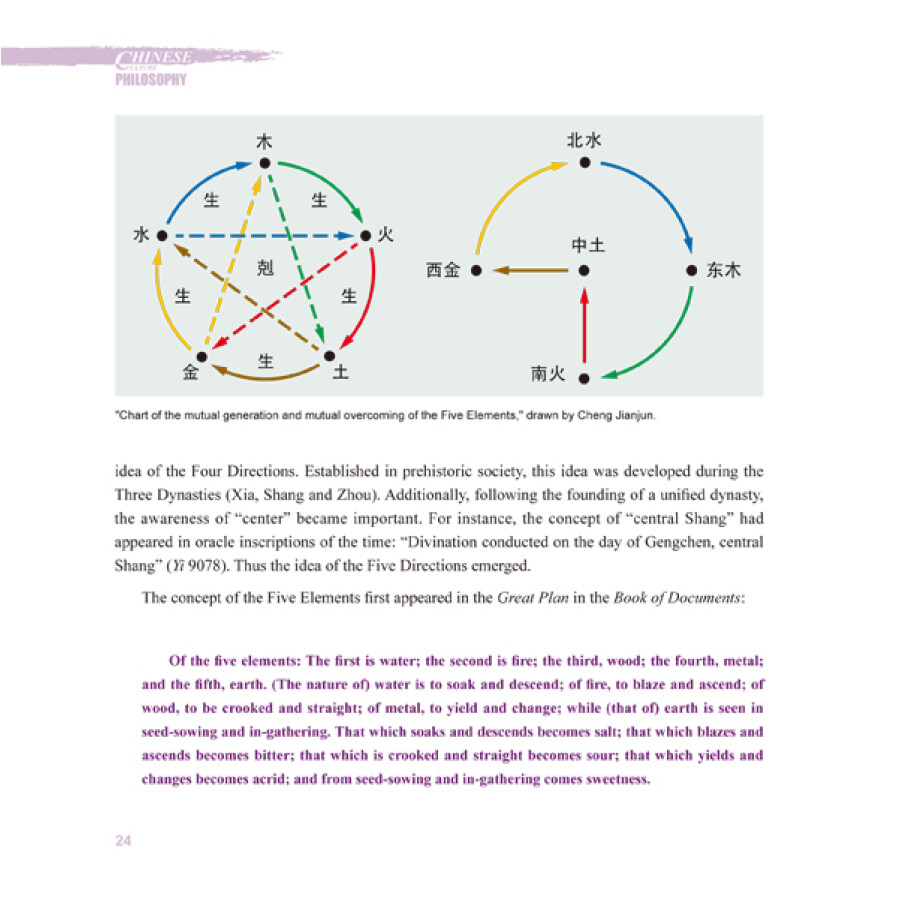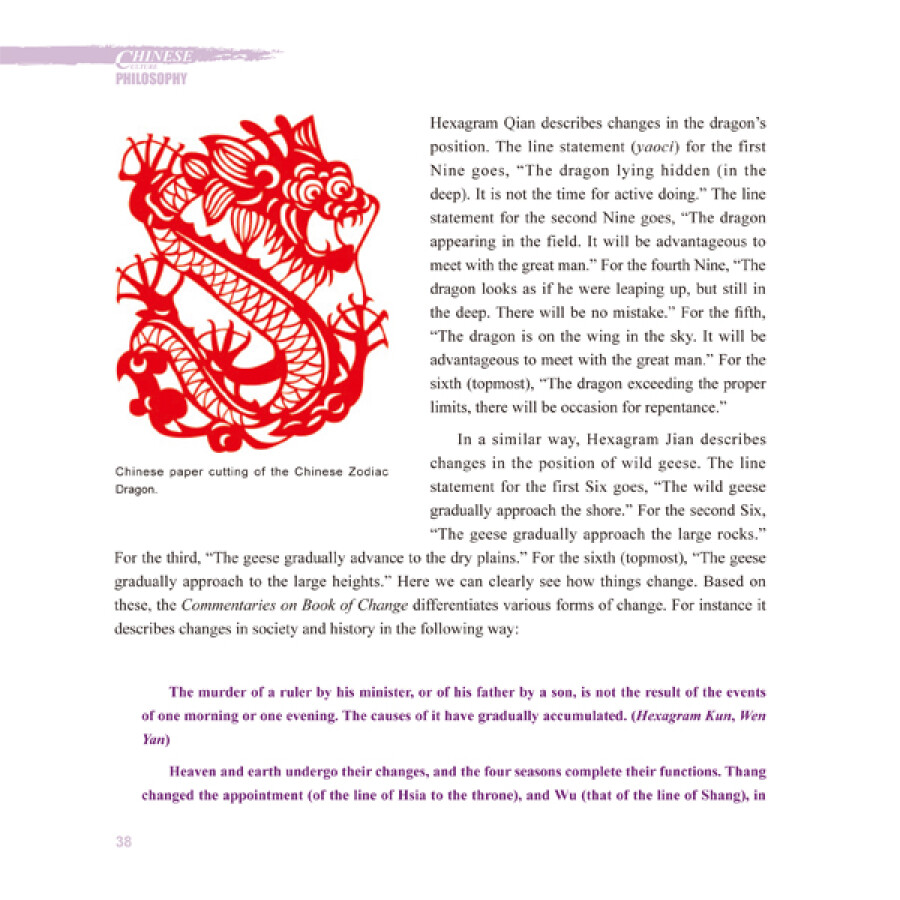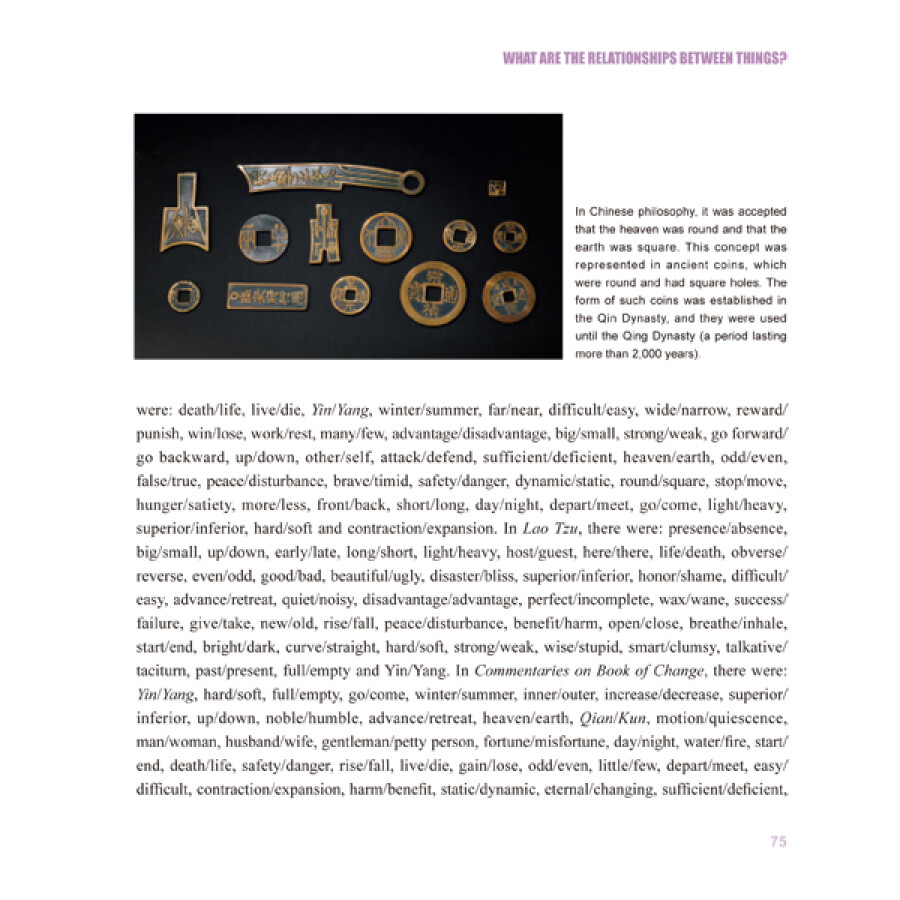Chinese Culture: Philosophic Thinking introduces Chinese philosophy from five topics, namely what is the nature of the world; what is the relationship between things; what is the law of society; what is the orientation of life; what is the structure of understanding, attempting to help readers to grasp the basic features of Chinese philosophy by reading this book.
Contents
Preface
WHAT IS THE NATURE OF THE WORLD?
The Birth of Beliefs
Shen, the Religious Source of Chinese Philosophical Ideas
Atheism
The Formation of Concepts about Nature
Yin and Yang and the Five Elements: the Intellectual Source of Chinese Philosophical Ideas
Vestiges of Magic
Observation and Thinking about Phenomena
The Concept of Difference or Diversity
The Concept of Change or Changeability
Sameness and Difference, Constancy and Change
The Quest for Essence and Laws
Dao
Li
Qi
WHAT ARE THE RELATIONSHIPS BETWEEN THINGS?
The Relationship Between Heaven and the Human, and its Religious and Intellectual Background
The Religious Approach to the Heaven- Human Relationship
The Intellectual Approach to the Heaven- human Relationship
The Dialectical Outlook
Opposition
Mutual Reliance
Transformation
Relativity
The Holistic Outlook
The Golden Mean
Consideration of Both Sides
Synthesis
Association
WHAT ARE SOCIAL NORMS?
Moral Consciousness and the Establishment of Confucian Moral Principles
The Zhou Dynasty: the Origin of the Sense of Morality
Confucius: the Tradition of Rites and the Spirit of Benevolence
The Development of Confucian Social Norms
Mencius’ Idea of Benevolent Rule and Xun Zi’s Idea of “Propriety and Law”
Edification and the Ethical Tradition of Chinese Civilization
The Confucian View on “Righteousness vs. Profit” and “Heavenly Principle vs. Human Desire”
Reflections on Social Issues in Other Schools of Thought
The Taoist Idea of Non-action
The Legalist Idea of Rule by Law
Views on History
Various Views on History
The Circulatory Theory of History
WHAT IS THE PROPER ORIENTATION OF LIFE?
The Ideal Confucian Character and its Cultivation
The Ideal Confucian Character Established by Confucius
The Cultivation of the Ideal Character
Music and Character Building
Completion through Music
Equilibrium and Harmony
The Confucian Theory of Human Nature
Mencius’ Doctrine of the Goodness of Human Nature
Xun Zi’s Doctrine of the Evil of Human Nature
The Development of Theories on Human Nature
The Taoist Outlook on Life
Lao Tzu’s Outlook on Life
Chuang Tzu’s Outlook on Life
WHAT IS THE STRUCTURE OF KNOWLEDGE?
The Source and Ability of Knowledge
Knowing and Not Knowing
Mind and Object
Name and Substance
Language and Meaning
The Structure or Form of Knowledge
Information and Thinking
Gradual Study and Epiphany
Investigating Things and Gaining Knowledge
Removing Obstructions
Receptiveness and Serenity
Views on Knowledge and Action
The Foundation of Early Views on Knowledge and Action
Word and Action, Knowledge and Practice
Zhu Xi’s View on Knowledge and Action
Wang Yangming’s View on Knowledge and Action
Wang Fuzhi’s View on Knowledge and Action
Appendix
The Ideal Confucian Character and Its Cultivation
Confucians held the ideal that one should possess the sage’s virtue and practice the ruler’s policy. The latter issue was discussed was discussed in Chapter 3, and it was also mentioned in relation to the Eight Terms (Ba Tiao Mu) in Great Learning: to regulate the family, to maintain the state rightly and to make all peaceful. Practicing the ruler’s policy was, in fact, linked to the idea of the sage’s virtue, which was mentioned in Great Learning as being about “cultivating morality” (Xiu Shen) and as comprising righteousness and sincerity. Great Learning began with: “The great learning teaches to act in accordance with morality (Ming De), to respect citizens, and to maintain the perfectness,” (Zhi Shan). Here, Ming De and Zhi Shan are referring to the ideal cultivation of morality, which would lead to the development of an ideal human character. Actually, the idea of the ideal character was first established in the Confucianism of Pre-Qin times.
The Ideal Confucian Character Established by Confucius
The ideal Confucian character consisted of the following principles (which were mainly established by Confucius):
One: Tao and Righteousness. These principles mainly centered on righteousness and profit and included three rules.
1. Righteousness is the most important principle of the ideal character. Confucius said, “A gentleman gives priority (Shang) to righteousness,” (The Analects, Yang Huo). Here, Shang meant “the first place.” Xun Zi elaborated on this idea further, “A gentleman can be insulted by power but not by the loss of Righteousness,” (Xun Zi, On Righteousness). Tao and Righteousness were so important that Confucius said, “I can die in the dusk as long as I know what Tao means in the morning,” (The Analects, Li Ren).
2. Value righteousness and underestimate profit. The edict that “righteousness is the most important” also meant that “profit has the least importance.” Confucius said, “I remind myself of righteousness when facing profit,” (Xian Wen) and “It is meaningless to me when I obtain wealth and power but act against righteousness,” (Shu Er). However, Mencius overstated the value of righteousness, “It is unnecessary to mention profit as there is only benevolence and righteousness,” (Mencius, King Hui of Liang I).
3. Be satisfied with poverty and devoted to Tao. This rule indicated how a person should act in the face of poverty. Confucius stressed, “Wealth and power are what man desires, but he must not enjoy them if he obtains them in an improper manner. Poverty and humanness are what man dislikes, but he must not abandon them if he abandons them in the wrong way. How should a gentleman be called a gentleman if he discards benevolence? A gentleman cannot live without benevolence even when he has dinner, even when he faces urgency, and even when he suffers homelessness.” (Li Ren) Confucius took Yan Hui, his disciple, as an example: “Yan Hui, so virtuous! He lives with a bamboo dish of rice and a gourd of drink in a remote lane. When others worry him, he does not change his devotion. Yan Hui, so virtuous! (Yong Ye).” Here, Confucianism places the gentleman in opposition to the petty man.
Two: The principle for ideal. This was mainly based on moralism and included four rules.
1. Improving oneself. This rule stated that a man should follow the rule “improve oneself” when faced with the goodness and evil (in the same way that he should follow the rule “satisfied with poverty and devoted to Tao” in the face of poverty). Confucius said, “One should serve the ruler when Tao is practiced and seclude oneself when Tao is not practiced,” (Tai Bo) and “One should take a small raft and live a secluded life when Tao is not practiced,” (Gong Ye Chang). Mencius also stated, “In poverty, one should maintain one’s integrity; when on the rise, one should make perfect the whole country,” (With All Heart I).
2. Adhere to goodness. This rule highlighted the importance of upholding the truth, as Confucius said, “One should adhere to benevolence and even surpass his teacher,” (King Ling of Wei) and “One should be devoted to honesty, learning, and goodness with whole heart,” (Tai Bo).
3. Maintain integrity. Confucius said, “One can carry off the commander from a whole army, but cannot take away the will of the common folk,” (Zi Han). Zeng Sen said, “Could a man be called a gentleman, to whom a ruler can entrust his young successor and the whole country, who does not change his will in the face of peril? Yes, he must be a gentleman,” (Tai Bo).
4. Devote your life to Tao. The final rule was to devote one’s life to Tao. Confucius said, “One with “ideal” sacrifices himself to practice benevolence rather than harm benevolence for his survival,” (King Ling of Wei). Mencius said, “One with “ideal” does not fear if he is deserted in the wild; one with valor does not fear if he is killed,” (Duke of Wen of Teng II) and “One should devote himself to Tao when Tao is not practiced,” (With All Heart I). This rule elevated Confucian morality to the highest level, as it called for the highest and most noble of sacrifices.


